How to run a Training Needs Assessment (tips + templates)

A training needs assessment (TNA) is a process through which training program designers come to define key elements of a future learning intervention (could be a class, course, program, experience, workshop).
The main aim of a training needs assessment is to clarify a current and desired state of things, and understand how to bridge the gap between the two. In this guide, we'll explore how to run a training needs assessment and share tips on how to use the information you receive and make this the basis of an effective learning solution.
Training needs assessments come in many shapes and sizes. Let’s say, for example, that legislation which impacts your company is about to change. A training needs assessment will go into details about what knowledge and skills are present in the company currently, and what needs an update.
Depending on the context, a TNA will imply a lot of documentary research, collecting competence audits and reviews of performance materials from the past, as well as interviews with clients and participants. In this article we will go into details about what such a process entails.
Whatever the scope of your training program, you can certainly find some inspiration that will help you target your content and design specifically to real-world needs.
In this article, we will cover:
Training Needs Assessment vs Training Needs Analysis (TNA vs… TNA!)
Does TNA actually stand for needs assessment, or needs analysis? Is there any actual difference between the two? While I have seen assessment and analysis used interchangeably in a lot of L&D literature, they actually refer to two slightly different processes.
The word “analysis” is usually used to refer to a vast, holistic audit of an entire organization’s training needs. The objective here is to examine the workings of a company or institution as a whole and figure out strategic training directions and needs. This process is likely to be run by an L&D department or external consultants.
When we talk about learning needs assessment we are generally referring to a more targeted process, typically aimed to design a training program or course that is already in the stars. It is shorter than a Training Needs Analysis and might be run by individual trainers or a few people in an L&D team.
The two processes are, of course, closely related to each other. If your organization has already run a training needs analysis, your job to assess individual training needs will be much easier. And any training needs assessment is likely to include some elements that look at what is going on in the organization as a whole, in order to align with general strategies and understand performance gaps.
Because this article is written mainly with trainers in mind, we’ll be focusing on the Assessment side of things, but keep in mind that some processes and tips are common to the two, just working on two different levels.
Why should you run a Training Needs Assessment?
Running training courses just for training’s sake is a recipe for disaster. We see it happen sometimes when funds are made available for training, perhaps because of a government subsidy, and courses are set up without much thought having gone into them. The result are disengaged participants, resources spent, and a day of work lost. This is trap we should not fall into!
Instead of training for training’s sake, it’s important for organizations to carefully consider what their problems and needs are, and figure out how to bridge this divide.
In a training needs assessment you’ll be looking at organizational, operational and individual training needs (more on those categories later) to understand where it’s most worth investing time and energy.
Is the root cause of recurrent issues related to communication skills, for example? Are parts of the organization bogged down by technical matters that could be solved by upskilling part of the workforce?
Take the time to run a training needs assessment before establishing what resources to allocate to learning interventions, will ensure that:
- Courses are fit for purpose;
- Resources are used appropriately, with a good Return On Investment (ROI);
- The organization’s goals are fulfilled;
- Participants gladly spend their time in training;
- Trainings are well-received and effective.
Suppose you come to this game as a relatively experienced trainer or learning designer. If that is you, it’s worth noting that a needs assessment is also a great way to sift and choose among the many ideas, methods and directions you can imagine your programs going in.

Learning needs assessments are great ways to set the direction of larger projects and avoid costly mistakes. I was recently involved as a workshop facilitator in a public project on nature conservation in which learning needs were assessed too late, to tragicomic results.
The original project insisted on multi-stakeholder, participatory workshops, to be led by yours truly.
As a passionate facilitator and advocate for the sort of event where diverse participants come up with solutions to complex problems themselves, I was thrilled to join. But when a few months into the project we looked at the actual needs of the locals involved (farmers and cattle-breeders living on the borders of national parks) we realized their problems stemmed from a lack of information.
Participants to this program did not, in fact, need multi-stakeholder problem-solving but rather an update to their technical knowledge base, better achieved through classes with Subject Matter Experts (SMEs) sharing specific knowledge (in this case, veterinarians).
I still joined the classes to support participatory learning but, frankly, resources were misdirected. Running a learning needs assessment earlier would have quickly revealed that subject matter expertise was the way to go in order to share necessary skills in the target audience. A facilitation role might have been more useful at a later stage.
What is the output of a Training Needs Assessment?
Now that we’ve defined what a training needs assessment is for, you might start wondering what it looks like. While there are numerous templates available online, there is not one universal agreement on what the output of a training needs assessment should be. It might look like a report, a table, or a short course outline, depending on the context and on the preferences of trainer and client.
Three of the most common ways to package a training needs assessment into an output document are:
- A course outline. This implies that the trainer or training team has already done the work of translating their needs assessment directly into a proposal. A course outline is an appropriate output of a TNA for short, targeted interventions. You’ll be creating a course outline, for example, if you are running a TNA as part of the process of designing a training you’ve already been commissioned to hold.
- A report, containing key information gathered and making a business case for future training interventions. This is more likely to be a required output for a medium-to-long term training program. In such cases, training needs assessments and training need analysis, which we’ve defined as a process looking at knowledge and/or skills gap in the entire organisation), might overlap.
- A table or canvas outlining information gathered. This type of output, which feels more like a work-in-progress, is most appropriate if your TNA is feeding into the work of a training or L&D team. You’ll be gathering with the team to look at results of the Assessment and use them together for later design stages. Such a table or canvas is also extremely useful if you are working alone, as you can use it to inform a course outline proposal but also go back to it at any time during later stages, to check your thinking.
To help you along the way, we’ve created a training needs assessment template. You’ll find guidance on how to run client meetings and participant interviews (more on this below) as well as a canvas to download and fill out as you collect training needs information.
We hope this is a great starting point, but remember to check and add any missing parts, depending on your specific context!
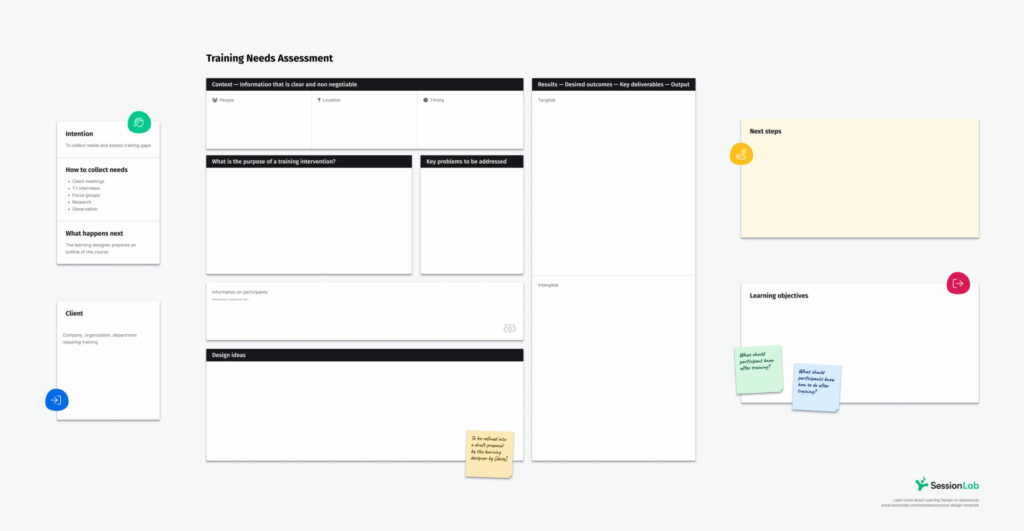
What information are you looking for when assessing training program needs?
In essence, a training needs assessment is a document containing results of pre-design research. The aim of this research is to inform training organization and design. So, what kind of information should it contain?
A training needs assessment should include information of three types:
- Information on the participants
- Information on the client (i.e. the group, organization or institution that commissioned this TNA)
- Information on the context (depending on the specifics, this might include research on the specific field, market trends, competitors and more).
Let’s look at these three areas in turn.
Information on the participants
Here are some of the questions you may want to answer in your training needs assessment, related to participants. Note that in some cases this information can be very specific, such as if you are designing a training for an established team, while in others it will be more generic, such as when working on an education program for students who have not enrolled yet.
- Who are the participants?
- What is known about their demographics and backgrounds?
- What would their motivation be to join?
- What are they likely to know already (knowledge)?
- What are they likely to know how to do already (skills)?
- What stage of their career development are they at?
- What other learning courses are they taking part in? What comes before and after, in their learning journey?
When collecting information on prospective participants, I feel a little bit like an investigator, and tend to take notes even on apparently random things that might come in handy later.
During a TNA I ran for a small political party wanting to upskill its staff and volunteers before an electoral cycle, for example, I learned that quite a number of volunteers were working single parents.
I put that information in my notes, and pulled it out again to advocate for holding training courses outside “normal” working hours. This eventually led to organizing weekend workshops, complete with a baby-sitting service.
Information on the client
There is never enough of this one. I have learned throughout my career, over and over again, that a lot of waste and trouble can be avoided by taking time to sit down with the people commissioning a training intervention and building a shared understanding.
If you are working as a learning specialist within your own organisation, you may find the term “client” does not apply. It might be a specific department asking for your support, rather than an external client. In any case, this is about drawing out information on the entity that requested a training intervention in the first place.
- Why has a training assessment been requested? What is the ambition?
- What needs are present in the organization?
- What is not working as well as it should be? What are the performance gaps?
- Where and how will participants be expected to apply learnings?
I like to begin client meetings by asking everyone involved to state their “high dream” or ambition, asking questions such as
- What is success for you? How do you know when things are going very well?
- In the best of all possible worlds, what would you want everyone in the organization to know, or know how to do?
Other type of information you’ll need to gather for a TNA are related to current parameters and company ways of working. To define relevant job behaviors and performance gaps, you’ll be looking to answer questions such as:
- What do you need staff members to learn how to do well?
- Where and how will they apply such knowledge?
Any knowledge you can gather about past training experiences will be invaluable:
- What has worked well in past training courses?
- What did not work so well?
These are key questions to identify the type of training program that will be the best fit for a certain organization.
If you’ve come so far you’ve probably already realized that the first question you’ll need ask yourself is: which questions do I need to answer in order to collect useful information for this specific context? What do you need to know about your client?

A note of caution: sometimes participants’ needs and client needs can contradict one another and even clash. This can be a critical time for facilitators and trainers. I believe all one can do in such cases is be open and aware, including of our own biases (are we taking the client’s side because, ultimately, they are the ones paying?), and navigate situations on a case-by-case basis.
Here’s an example: in 2021 I was hired by a social service organization wanting to train all their staff in specific facilitation methodologies and digital tools.
I began running interviews with some prospective participants and realized that after Covid-19 they were teetering close to burnout. Staff members had little to no motivation in learning new tools: instead, they expressed the need for spaces to meet their peers and recuperate, sharing self-care tips and resilience skills. There was, in my understanding, no room in those heads and hearts to learn any new technical solutions at all. What do you do in such a situation?
In that case, fortunately for me, I had kind, open-minded clients who listened to my observations and allowed me to change the program almost completely. Instead of learning how to host online and hybrid workshops, we focussed on inner resilience.
As facilitator and guide, I created spaces for staff members to share how hard the Covid years had been for their lives and work. We parked the new tools course for next year, when it was very well received.
Information on the context
This heading includes anything you’ll want to know that is not specifically related to the client you are designing for. Think market research:
- What else is going on in this field?
- What competencies are newly emerging as important?
Training needs to be forward-thinking: what skills will staff need in a couple of years? Let’s say you are collecting training needs for our marketing department here at SessionLab. In the current scenario, a quick look at what is going on in the overall field might lead you to include training on generative AI as a possible option.
In large organizations, what is needed at a department level will not coincide with overall organizational strategy, but you still might want to keep that in mind as well.
- Where is the organization going? What is its long-term strategy?
- What skills are needed to get there?
Three levels to keep in mind when running training needs analysis
Another way of looking at the types of needs analysis you may need to run before a training divides needs into organizational, operational and individual, depending on the scale you are looking at.
Organizational needs
Here you are enquiring about needs on the scale of the entire organization and looking for answers to questions such as:
- What are the knowledge gaps in the entire organization?
- What are the skill gaps?
- What are the training needs implied in the organization’s strategy?
- What has changed, or is going to change, in the organization?
- What are the organization’s objectives and goals? How could training help reach them?
Operational needs
This means looking at the scale of a single team, department or, in education, NGO or civic society work, of any small group formed around doing something together. Here you are analyzing whether the teams involved have all the resources, knowledge and skills they needed to perform a specific set of tasks. You’ll be asking questions such as:
- How well are jobs and tasks being performed?
- What is working well, what is missing?
- What skills or knowledge is missing in this team or group, in order for it to best perform its function?
Individual needs
Looking through the lens of individual needs simply means translating the discoveries made above to the level of a single person.
- What skills do people need to perform their job descriptions well?
- What is standing in the way of excellent job performance?
- What core competencies do people have? What are they missing?
We will see below how 1:1 interviews can help you uncover answers to such questions.
How to run a needs assessment process.
Gathering information for your TNA can happen in a lot of different ways. In the next paragraphs, we will look at a list of common ways to go through a needs assessment process.
Depending on the case at hand, you’ll need to perform at least two or three of these activities to get enough information to create a relevant course outline, needs canvas or full report.
Client meetings and some basic research might serve you well enough in many cases, although I will say that getting information directly from stakeholders and potential participants is often the most invaluable action. I cannot think of any case where all these tactics might be needed – that would be paralysis by analysis!
To kick off with a practical example, in the latest training course I organized, a two-day workshop with university students, I based my assessment on a (written) brief, a series of client meetings, and motivational letters from participants. This gave me enough information on the expectations of all parties involved to start designing.
How to collect client needs
The most common way of collecting needs from your client is through meetings. These can be team meetings, or 1:1 calls and conversations.
In this template based on the ADDIE framework of learning design, you can find an example of how to run a client meeting on the first page, dedicated to A for Analysis. I am a big proponent of having clients and stakeholders in the same room (virtual or in person), as long as the meeting is well facilitated and its purpose is clear.
When going into a meeting that is part of your training needs assessment process, you’ll be directing the conversation in order to get answers to some of the questions we’ve discussed in the previous paragraphs.
I think about the topics to be discussed as two separate categories: non-negotiables and negotiables. Things that are already decided and cannot be changed are the first things I like to know (for example, potential locations, or lists of attendees), as they will form the boundaries of later designs.
Once the main non-negotiables are clear, guide clients to go a bit deeper into explaining their needs and intentions. After this initial meeting, conversations might continue via email or other forms of direct communication.
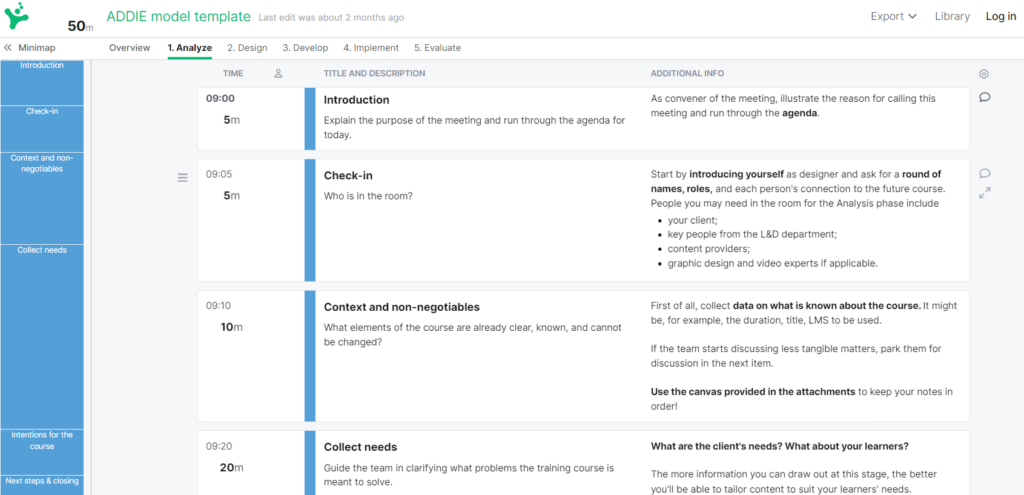
Another source of information from clients for your training needs process is a training brief, if it exists. Sometimes learning designers get brought in after various elements of the training have already been decided and discussed, and this material is summarized in a brief.
A final source of information that comes from the client are any reports and documentation on past learning interventions and training courses. Collect whatever material you can find on this: what worked? What didn’t? This will help you avoid repeating content, and repeating mistakes.

How to collect participant needs
A few years ago, before I was aware of how useful a needs assessment might be, I was tasked with training staff members from the local government office on the topic of mediation and human rights. Walking in the room, I had no idea where participants stood, what they already knew and what they didn’t. So I started with an introduction and then moved on to co-designing the program together.
This was great fun, and very exciting for the novice trainer I was. But in retrospect, I now wonder: was taking half a day to decide the topics of the training together really the best use of everyone’s time?
Co-design can begin well before the training starts if we carefully collect information, hold interviews and focus groups with participants. If I had done some prep work, I would have arrived better informed, and we would have been able to spend more time discussing the role of mediators, which was the key topic the group arrived at and that they wished to explore at length.
Your clients will of course be a direct source of information on prospective participants: who they are, how many will be expected to attend, their roles and expected performance and so on. That’s all well and good, but you can gain a deeper level of insight and empathy with participants by contacting them directly. Here are some ways of doing that.
Interviews and focus groups
Nothing beats direct contact with the people who will join a training program. If you can, run 1:1 interviews with some participants. These don’t have to be lengthy: a 30 minutes call is enough to get a sense of what is needed. In this template you can find a guideline on how to run such interviews.
Prepare for each interview by focusing on the questions you are looking for answers to. I generally prefer to start by asking for stories and insights from the past, as I find it keeps the conversation more grounded.
- Can you tell me about past trainings you joined? What do you remember? What was effective, what did not work so well?
It takes establishing a bit of trust before people will readily share what is not working well in their jobs. Sharing openly the purpose of your research, and guaranteeing confidentiality if that’s helpful and applicable, can help you reach a point where you feel it’s ok to ask questions such as:
- What are you struggling with at work right now? What could the company do to help you be more successful?
Try and also collect some logistical information. What dates and times are best to ensure people’s availability? Are there any major events in the calendar coming up that would make it impossible for some people to join? In my experience, clients tend to neglect these very pragmatic aspects of organizing training courses, so it may be up to you to surface them.
Focus groups are a different approach to collecting information from participants. In this case, you’ll be asking a group of about 8 people to spend about an hour together discussing a topic.
If you have the opportunity to run a focus group on training needs, make sure you figure out the best way of taking notes, as a lot of information gets shared in little time.
You might want a co-facilitator on board to note-take, or record the session and summarize your findings later (alone or with the help of some nifty AI transcribing and summarizing tools).
Motivation letters
Because I work a lot with Higher Education Institutions (HEI), I will often design courses that participants have to apply for, generally through a motivation letter. Yes, motivation letters can be rather rote (and, in recent times, sloppily written with substantial help from OpenAI’s ChatGPT), but they still contain useful information.
Prospective participants will generally share some key information about themselves, such as their background and interests. I like to read through motivation letters with the question in mind “What are participants’ expectations for this course?” and see if I catch anything that might change my course plan and design.
Just last week me and my co-facilitator Giulio went through 26 motivation letters for a workshop on Information Ecology. We received these letters quite late in the process; theoretically, our needs assessment was done already, via client interviews. Our design was already setup in SessionLab, where we had written up activities, timing and objectives for each section.
But facilitators are flexible, and we didn’t feel great about not having had opportunities to include the participants’ needs in our design directly. So we read the letters, then met to discuss “Have participants expressed any needs that are not yet addressed in our session plan?”
We found many letters stating a need for practical tools they could take away after the session and apply to their consumption and creation of media. As a consequence, we redesigned our final session and changed one of the group discussion questions to make sure this topic was covered.
Questionnaires
It’s quick and easy to prepare an online questionnaire for participants to fill out in order to collect some more information that might help identify training needs and inform course design. Here are some of my tips for success with pre-training questionnaires:
- Keep them short. Avoid people dropping out after the first few questions by asking FEW questions. I generally start with closed answers and only include a couple of open questions.
- This is important: questionnaires also contribute to setting expectations of how a training will be conducted. Keep them coherent with the tone and style of likely training interventions.
- Your questionnaires can multitask. Use them to collect practical logistical information as well, such as dietary preferences for lunch breaks.
- Always involve your client in checking over questions, they might have preferences and no-goes. It’s also a great opportunity to learn more about what they think about training needs in their organization.
In an example related to this last point, I recently created a questionnaire for prospective participants to a training on a new technical instrument for local authorities. I wanted to ask participants for their expectations for the training in an open question, but my client disagreed.
The technical content of the training was well established, he said, and he didn’t want participants to feel they could do much to change that.
In response to his observation, we changed the question to a set of quantitative measures asking participants to self-assess their pre-training knowledge of the topics. It was still extremely useful for me to read though, and the process of arriving there improved mutual understanding between me and my client.
What research to do for a Training Needs Assessment
Here we move into the realm of research you might be able to do as part of your analysis. Depending on the context, there are some areas you could investigate and find materials on, such as:
- Employee performance reviews. If these are documented, they can be a great source of information to identify skill gaps and define relevant job behaviors.
- Competition analysis. What is going on in the field? What are competitors doing? What new skills are emerging as relevant?
- Organizational strategy and other organization-wide documents. What are the company’s strategic aims? What are the current targets? How could training interventions help reach them?
- Shadowing and observation. Spending time on the company floor, or shadowing members of the organization in general, might also help gain new insights and feed into your analysis.
Do you have other tactics to add to this list? Let us know in the comments or join the discussion, we host a free online community of trainers and facilitators keen to discuss the finer points of their profession.
How to organize information gained from the assessment process
Whatever you choose to do, you’ll probably be combining a few of these tactics, and collecting information in a single place, until you have answered most, if not all, the questions you set off with.
Think carefully about how to organize the information you gather, and organize it in a way where you can efficiently find it at a later stage. We’ve set up a ready-made canvas you can use to take notes as you work through your TNA. Keep it all together and use it to inform your session design!
One important thing to remember is that training is not the only possible solution. Actually, training in isolation is unlikely to ever effectively change anything in a company or organization. Your needs analysis might uncover other ideas of practices to encourage besides, or alongside training.
For example, if your organizational assessment reveals issues with communication flows, besides a dedicated training you might want to suggest introducing a messaging system or some team rituals, to make sure change sticks beyond the duration of training initiatives.
How to use your needs analysis to design training programs
Once you feel you have gathered enough information on skill gaps, organizational goals, and all the other points detailed above, the next step is to use the information collected to define learning objectives. These are usually encapsulated in a few short sentences, often with a structure that sounds like:
- Upon completing the training, participants will know how to…
- Having completed the training, participants will be informed on…
Learning objectives are the north star of your training plans. Once I start designing, I like to make sure I am working on an effective training plan based on the needs identified by color-coding each learning objective in the SessionLab planner and ensuring I have included sections for each.
I also add a note on top of my plan where I summarize the overall objective of the same training, to make sure I always keep it in mind when making design choices. I’ll always keep a completed canvas close, to make sure I include results from my analysis every step of the way.

What next?
Once you have worked on the analysis phase of learning design, it will be time to move to designing and eventually delivering your workshop or training program.
For more information on what workshop planning implies, and a step-by-step guide to creating great workshops that ensure employee engagement and performance improvement, we’ve put together a comprehensive resource here.
If your findings lead in the direction of creating e-learning courses for staff, you’ll be more interested in how storyboarding works for flexible, self-paced learning. Find out guide to storyboarding.
As mentioned above, we have set up templates and canvases to help you speed up the process of gathering training needs.
You can find the canvas, as well as an example template of how to collect training needs with a combination of individual work, client meetings and participant interviews, in this training needs assessment template.
Lastly, to learn more about the next steps in learning design, check out our guide to ADDIE, the most well-known model of instructional design, guiding you from Analysis to Evaluation.
Let us know if you have other tactics and tips for training needs assessment in the comments below, or join the conversation in SessionLab’s Community!
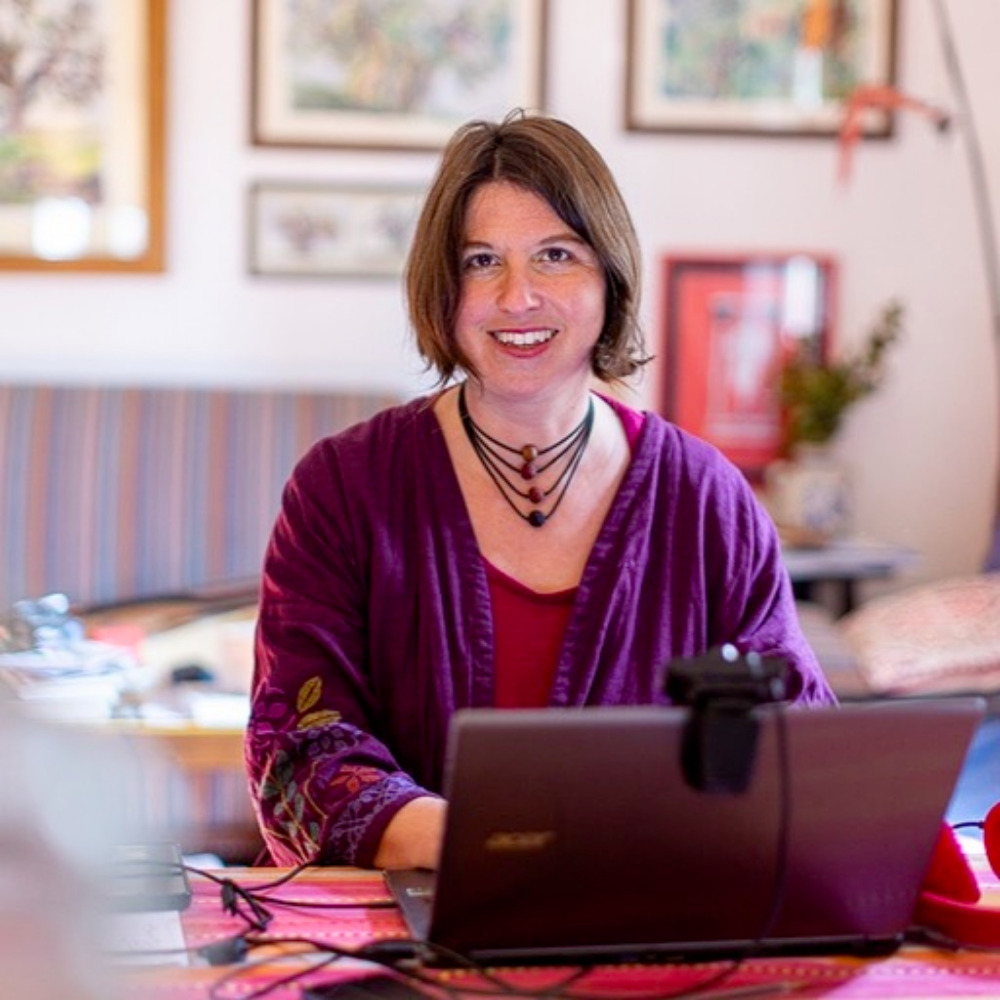
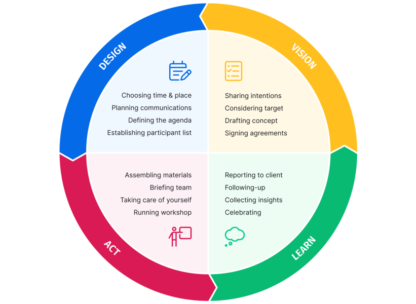

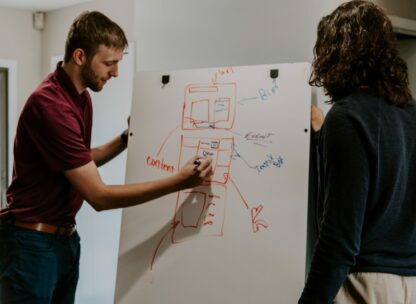
Leave a Comment